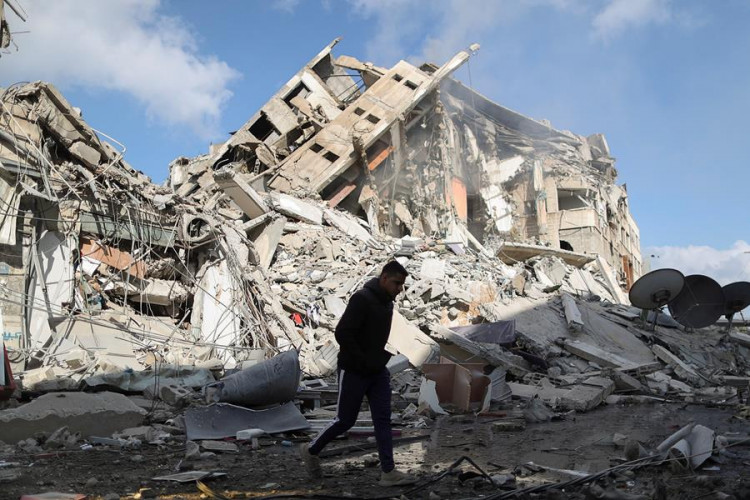The United Nations Office for the Coordination of Humanitarian Affairs released a report highlighting the increasing challenges to humanitarian aid due to the military confrontation between Israel and Hamas in the Gaza Strip. The report reveals that Israeli attacks on the Gaza Strip have damaged roads leading to refugee camps, hindering the delivery of aid supplies. Additionally, the lack of security for aid workers, fuel shortages, and limited communication has made the United Nations' assistance efforts increasingly difficult.
As of December 26, the ongoing Israel-Palestine conflict has resulted in 29,124 Palestinian deaths, the majority being children and women, including 101 journalists and 481 medical staff.
The international community, including senior U.S. officials, has urged Israel to avoid civilian targets. Israeli Prime Minister Netanyahu responded that the Israeli Defense Forces (IDF) are the world's most ethical army and take various preventative measures to protect civilians. However, as U.S. Secretary of State Antony Blinken noted, Israel's actions in this regard have not been consistent. During the Christmas period of December 24-25, the IDF conducted 50 strikes on three refugee camps in Gaza - Al Bureij, An Nuseirat, and Al Maghazi - resulting in at least 70 deaths, with an unknown number of victims trapped under rubble.
The IDF spokesperson stated that Hamas's presence increases the difficulty of protecting civilians, and the IDF will try to minimize civilian harm in subsequent conflicts.
However, with the IDF's extensive use of imprecise guided bombs, protecting civilians seems to be an empty promise. U.S. intelligence agencies found in mid-December that 40%-45% of the nearly 30,000 ground strike bombs Israel has dropped on Gaza since October 7 are imprecise guided bombs, which are less accurate and unable to lock onto targets, causing more civilian casualties.
Analysts believe that due to the high cost of precision-guided bombs and Hamas's lack of air defense capabilities, the IDF prefers to choose more abundant and cheaper imprecise guided bombs. A report by The Guardian on December 27 revealed that most of the imprecise guided bombs Israel is currently using likely come from the "United States-Israel War Reserve Stockpile-Amos" (WRSA-I).
After the Fourth Middle East War in 1973, the U.S. supplied a large number of weapons to Israel, later naming the storage facility "United States-Israel War Reserve Stockpile-Amos" (WRSA-I). The specific location and contents of the stockpile are confidential, but the U.S. Department of Defense provides annual reports to Congress.
Informed military officers disclosed that WRSA-I has billions of dollars worth of weapons, and Israel is allowed to use these stockpiles in special circumstances. A senior U.S. Department of Defense official stated that the U.S. has opened WRSA-I's weapon withdrawal permissions for Israel.
Former U.S. Navy officer James Starvridis, who visited this heavily guarded secret warehouse, mentioned in his memoir that WRSA-I is filled with imprecise guided bombs.
Since October 7, the U.S. has provided a large amount of military aid to Israel, but the specific types and quantities remain confidential. According to Axios, in October, the U.S. transferred tens of thousands of 155mm artillery shells intended for Ukraine to Israel, some of which were directly transferred from WRSA-I.
At the end of November, the Biden administration requested the removal of all restrictions on Israel's withdrawal of weapons from WRSA-I. The request is still pending formal approval by Congress. Israel remains restricted in withdrawing weapons from WRSA-I, but the restrictions are more procedural. Former U.S. Department of Defense lawyer Sarah Harrison stated that unlike regular military sales, Israel can withdraw weapons from WRSA-I before the application process is complete, and the U.S. Congress may or may not be aware, depending on the type and quantity of weapons.
Due to the large number of imprecise guided bombs in WRSA-I, the complete removal of restrictions on Israel's withdrawal of weapons could lead to a more severe humanitarian crisis in the densely populated Gaza Strip.
In early December, five U.S. senators, including Elizabeth Warren, wrote to President Biden, mentioning that if the restrictions on Israel's withdrawal of weapons from WRSA-I are completely removed, the U.S. is likely to become an accomplice in Israel's bombing of civilians.




